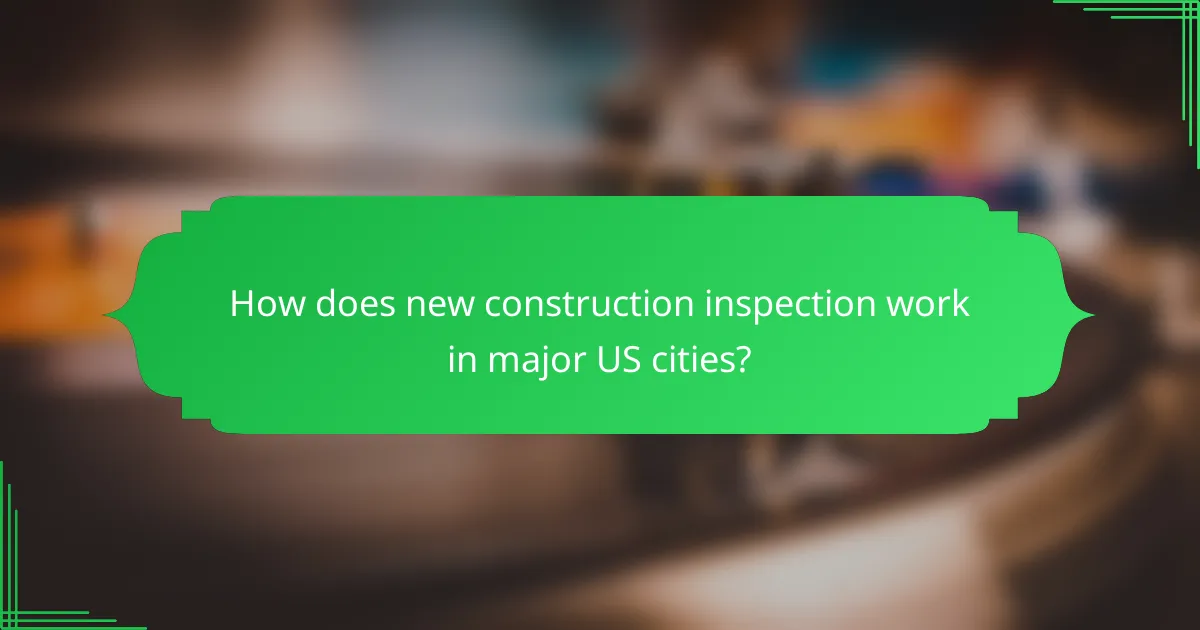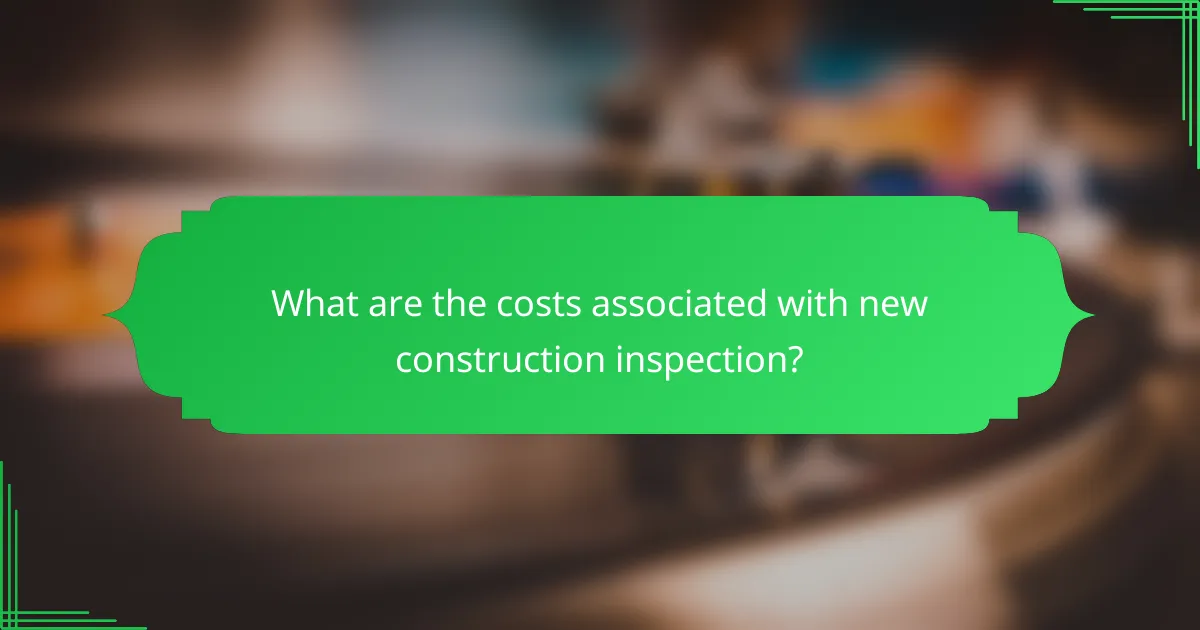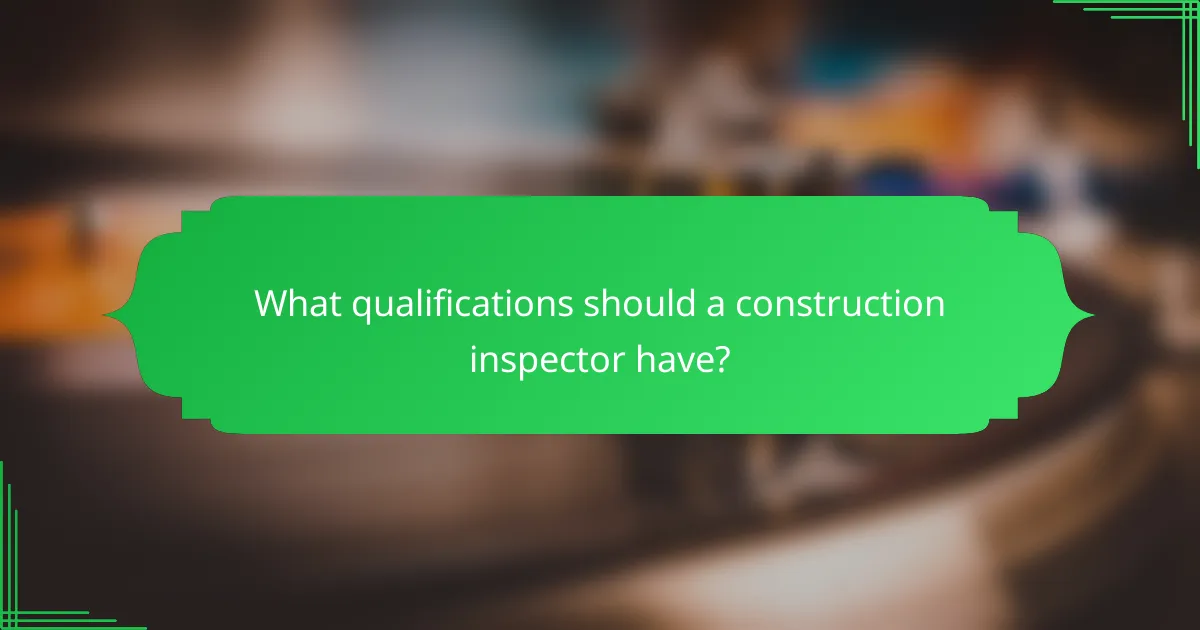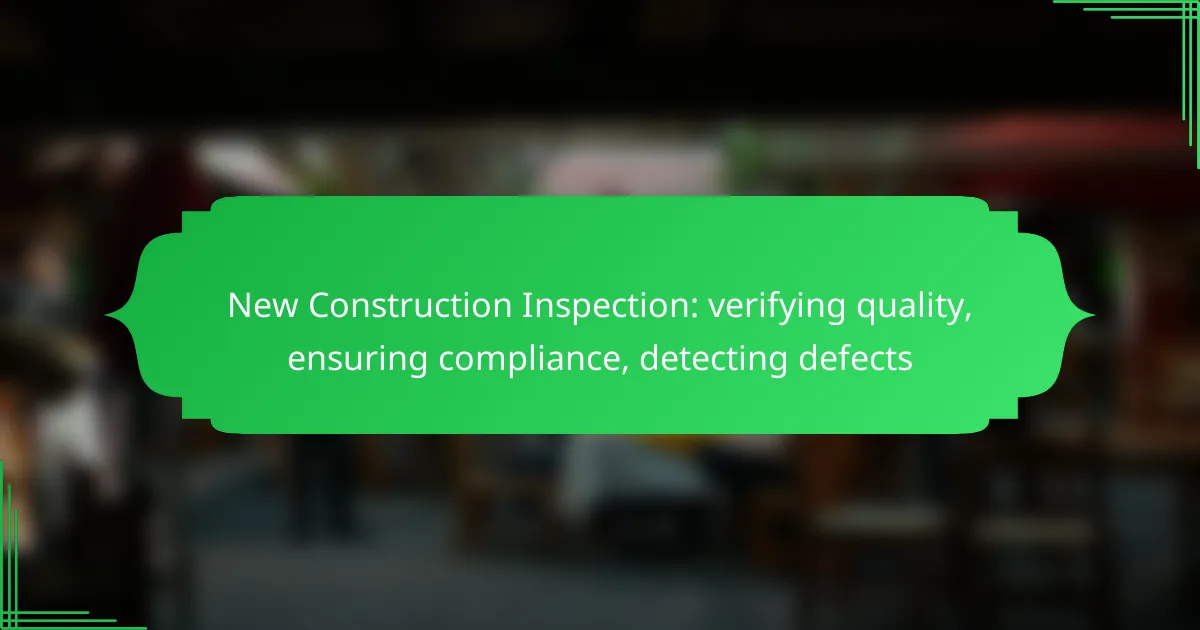New construction inspection is a vital process that verifies the quality and compliance of buildings with local regulations. By identifying defects early, it not only enhances construction quality but also reduces long-term maintenance costs and boosts buyer confidence. This thorough evaluation includes pre-construction assessments, ongoing inspections, and final walkthroughs to ensure safety and adherence to building codes.

What are the key benefits of new construction inspection?
New construction inspection offers several key benefits, including ensuring compliance with local building codes, identifying potential defects early, and enhancing the overall quality of construction. These advantages ultimately lead to reduced long-term maintenance costs and increased buyer confidence in the property.
Ensures compliance with building codes
New construction inspections verify that the building adheres to local and national building codes, which are designed to ensure safety and structural integrity. Inspectors check for compliance with regulations regarding electrical systems, plumbing, and structural elements.
Failing to meet these codes can lead to costly fines and the need for expensive rework. Engaging an inspector early in the construction process helps ensure that all work meets the required standards, reducing the risk of non-compliance issues later on.
Identifies potential defects early
Early detection of defects is a critical benefit of new construction inspections. Inspectors can identify issues such as poor workmanship, material deficiencies, or design flaws before they become significant problems.
Addressing these defects during the construction phase can save time and money, as repairs are typically less costly when made early. Regular inspections throughout the building process can help maintain quality and prevent future complications.
Enhances overall construction quality
New construction inspections contribute to enhanced construction quality by ensuring that all aspects of the project meet established standards. Inspectors evaluate materials, workmanship, and adherence to plans to ensure a high-quality final product.
By maintaining high standards, builders can improve the durability and performance of the structure, leading to fewer issues down the line. This proactive approach to quality control can also enhance the reputation of the builder in the market.
Reduces long-term maintenance costs
Investing in new construction inspections can lead to lower long-term maintenance costs. By identifying and addressing issues early, property owners can avoid the expenses associated with major repairs and renovations later on.
Structures built to code and with high-quality materials typically require less frequent maintenance, which can translate to significant savings over the life of the building. This financial benefit is particularly important for commercial properties where maintenance costs can impact profitability.
Increases buyer confidence
New construction inspections increase buyer confidence by providing assurance that the property has been built to meet safety and quality standards. Buyers are more likely to invest in a home or commercial space that has passed thorough inspections.
Additionally, having inspection reports available can enhance transparency in the buying process, making it easier for potential buyers to make informed decisions. This confidence can lead to quicker sales and potentially higher property values in the competitive real estate market.

How does new construction inspection work in major US cities?
New construction inspection in major US cities involves a series of evaluations to ensure that buildings meet safety, quality, and regulatory standards. This process typically includes pre-construction assessments, ongoing inspections during construction, and a final walkthrough to verify compliance and detect any defects.
Pre-construction assessments
Pre-construction assessments are critical for identifying potential issues before the building process begins. Inspectors evaluate the site, reviewing plans and ensuring compliance with local zoning laws and building codes. This stage often includes soil testing and environmental assessments to prevent future complications.
During this phase, it is essential to engage qualified professionals who can provide insights into necessary permits and regulations. Failing to address these factors early can lead to costly delays and modifications later in the project.
Ongoing inspections during construction
Ongoing inspections during construction are conducted at various stages to ensure that work adheres to approved plans and standards. Inspectors check structural integrity, electrical systems, plumbing, and safety features, often at key milestones such as foundation pouring, framing, and before drywall installation.
Regular inspections help catch defects early, reducing the risk of expensive repairs later. It’s advisable to maintain clear communication with inspectors and contractors to address any issues as they arise, ensuring that the project stays on schedule and within budget.
Final walkthrough and report
The final walkthrough is a comprehensive inspection that occurs once construction is complete. Inspectors review the entire property to ensure that all work meets local codes and the original specifications. This step is crucial for identifying any remaining defects or unfinished work that needs to be addressed before occupancy.
After the walkthrough, a detailed report is generated, outlining findings and any necessary corrective actions. Homeowners or property managers should carefully review this report and ensure that all issues are resolved before finalizing any payments or moving in. This diligence can prevent future headaches and ensure a safe living environment.

What are the common defects found during inspections?
Common defects found during new construction inspections include structural issues, electrical system deficiencies, plumbing leaks, improper insulation, and faulty roofing installations. Identifying these problems early can save time and money, ensuring compliance with safety standards and building codes.
Structural issues
Structural issues often involve problems with the foundation, framing, or load-bearing walls. These defects can lead to significant safety hazards and costly repairs if not addressed promptly. Inspectors should look for signs of settling, cracks, or misalignment in structural elements.
Common indicators of structural issues include uneven floors, doors that stick, and visible cracks in walls or ceilings. It’s crucial to consult a structural engineer if these signs are present, as they can assess the severity and recommend necessary repairs.
Electrical system deficiencies
Electrical system deficiencies can pose serious safety risks, including fire hazards. Common issues include improperly wired outlets, outdated electrical panels, and insufficient grounding. Inspectors should verify that all electrical work complies with local codes and standards.
During inspections, check for exposed wiring, overloaded circuits, and the presence of GFCI outlets in wet areas. Ensuring that the electrical system is up to code can prevent future electrical failures and enhance safety.
Plumbing leaks
Plumbing leaks are a frequent issue in new constructions and can lead to water damage and mold growth. Inspectors should examine all visible plumbing connections, fixtures, and pipes for signs of leaks or corrosion. Early detection is key to preventing extensive damage.
Common signs of plumbing leaks include water stains on walls or ceilings, dampness around fixtures, and unusual increases in water bills. Regular inspections can help identify and address these issues before they escalate.
Improper insulation
Improper insulation can lead to energy inefficiency and increased utility costs. Inspectors should check that insulation is installed correctly in walls, attics, and crawl spaces, ensuring there are no gaps or compression. This is essential for maintaining comfortable indoor temperatures.
Inadequate insulation can result in drafts, higher heating and cooling costs, and moisture problems. Using the right type of insulation for the climate and ensuring proper installation can significantly improve energy efficiency.
Faulty roofing installations
Faulty roofing installations can result in leaks, structural damage, and reduced lifespan of the roof. Inspectors should assess the roofing materials, installation techniques, and drainage systems to ensure they meet industry standards. Proper ventilation is also critical to prevent moisture buildup.
Look for signs of poor installation, such as missing shingles, improper flashing, and sagging areas. Addressing roofing defects early can prevent costly repairs and extend the life of the roof.

What are the costs associated with new construction inspection?
The costs associated with new construction inspection can vary significantly based on several factors, including the project’s size and complexity. Typically, these expenses are an investment in ensuring quality, compliance, and defect detection, which can save money in the long run.
Average inspection fees
Average inspection fees for new construction can range from a few hundred to several thousand dollars, depending on the scope of the inspection. For instance, basic inspections might start around $300, while comprehensive evaluations for larger projects can exceed $1,000. It’s essential to obtain quotes from multiple inspectors to understand the market rates in your area.
Factors affecting pricing
Several factors can influence the pricing of new construction inspections. The size and complexity of the project are primary considerations; larger or more intricate builds typically require more time and expertise. Additionally, the location can impact costs, as urban areas may have higher fees due to increased demand and living costs.
Other factors include the type of inspection required, such as structural, electrical, or plumbing evaluations, each with its own pricing structure. The inspector’s experience and qualifications can also lead to variations in fees.
Cost-benefit analysis of inspections
Conducting a cost-benefit analysis of inspections reveals that the upfront costs can lead to significant savings by identifying defects early. For example, addressing issues during construction is often less expensive than making repairs after completion. Investing in inspections can enhance the overall quality and longevity of the building.
Moreover, inspections can help ensure compliance with local building codes and regulations, potentially avoiding costly fines or legal issues. Weighing these benefits against the inspection costs typically shows a favorable outcome for property owners and developers alike.

What qualifications should a construction inspector have?
A construction inspector should possess a combination of education, experience, and relevant certifications to ensure quality, compliance, and defect detection in new construction projects. Typically, a background in engineering, architecture, or construction management is essential, along with specialized training in building codes and inspection techniques.
Educational background
Most construction inspectors hold at least an associate degree in construction technology, civil engineering, or a related field. A bachelor’s degree can enhance job prospects and provide a deeper understanding of construction principles. Courses in structural design, materials science, and building codes are particularly beneficial.
Certifications and licenses
Certifications from recognized organizations, such as the International Code Council (ICC) or the National Institute for Certification in Engineering Technologies (NICET), are valuable for construction inspectors. These credentials demonstrate expertise in specific areas, such as residential or commercial inspections. Additionally, some states require inspectors to obtain a license, which may involve passing an exam and completing continuing education.
Experience and skills
Hands-on experience in construction or a related field is crucial for effective inspection. Many inspectors start as construction workers or project managers before transitioning into inspection roles. Key skills include attention to detail, strong communication abilities, and a thorough understanding of building codes and safety regulations.
